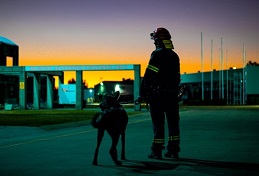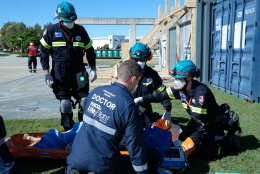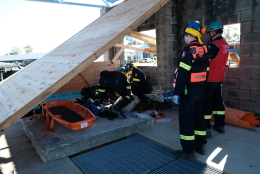Role and responsibilities of DART Volunteers
We maintain a Disaster Assistance Response Team (AUS-1 DART).
AUS-1 DART is made up of firefighters, paramedics, communications, mechanics as well as volunteer doctors, engineers and canine handlers and their dogs.
It’s one of two internationally classified ‘Heavy’ Urban Search and Rescue (USAR) teams within Australia. This means they are assessed under the International Search and Rescue Advisory Group (INSARAG) External Classification (IEC) process and must reclassify every 5 years to maintain currency.
What type of events do the AUS-1 DART team respond to?
AUS-1 DART deploys as a self-contained rescue team to assist communities in need, both nationally and internationally, after:

- earthquakes
- tsunamis
- cyclones
- severe weather and storms
- flood assistance
- hazardous materials (HazMat) incidents.
Depending on the emergency and assistance needs, the team can deploy in multiple formats. This can include the full deployment of the 75-person team for 14 days, living in the field in austere environments. Deployments may also include smaller teams for varying time periods.
Additional Information
Please ensure you view the following documents before submitting your application:
- Guide to apply for a blue card online (PDF, 840 KB)
- Code of conduct
- Statement of Cultural Intent (PDF, 275 KB)
- Acceptable use policy (PDF, 90 KB)
- Privacy Principles Policy (PDF, 204 KB)
Requirements for all volunteers
ll AUS-1 DART team volunteers are an integral part of the deployable Disaster Assistance Response Team managed by us. All taskforce specialists are subject to whole-of-government and our relevant policies and procedures during their period of employment, including the AUS-1 DART command and control systems.
To be considered for available vacancies you will need to meet mandatory requirements including to:
- be physically fit and meet the required medical standards for international deployment
- be over 18 years of age
- be able to deploy at short notice for a period of up to 14 days, including the ability to be at the departure airport within 10 hours of activation: that is, you can be at the State Deployment Centre (Brisbane) within 4 hours of notification
- be comfortable with field living and ablutions arrangements while on deployment. (camping in the field, with camping style wash and toilet facilities)
- be comfortable with field messing arrangements (eating supplied ration packs for the duration of the deployment)
- participate in initial training and progressive training for volunteer specialists as required for AUS-1 team members, and for your specialty
- be able to work at heights and in confined spaces.
- complete online training modules as required to meet team requirements
- be able to obtain a current First Aid and CPR certificate
- participate in annual 48-hour field exercises as programmed
- have a current Australian Passport
- have no restrictions that will restrict you from entering another country, or returning to Australia
- have (or be eligible to apply for) a current Blue Card
- have (or be eligible to obtain) a clean criminal history check for Australia
- agree to undertake the required vaccination program as approved by the National Critical Care and Trauma Response Centre (NCCTRC), and maintain your vaccination status for deployment (vaccinations costs are covered by AUS-1 DART team)
- agree to have your photo and video images shared with media during training and deployment
- comply with the Queensland Government Code of Conduct and the DFAT Code of Conduct
- comply with gender, diversity, inclusion and child protection requirements as provided
- maintain issued equipment and kit in a state of readiness for immediate deployment as required.



